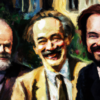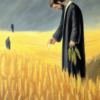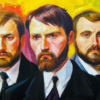Individuals are engaged in a constant process of positioning themselves in relation to one another.
Erving Goffman, “The Presentation of Self in Everyday Life”.
Erving Goffman’s work on the presentation of self in everyday life can provide valuable insights into the characters of Dostoevsky’s Brothers Karamazov. In his book, “The Presentation of Self in Everyday Life,” Goffman argues that individuals are constantly performing in order to present a certain image of themselves to others and that these performances are heavily influenced by the social context and the expectations of the audience.
When examining the characters of the Brothers Karamazov, we can see how Goffman’s theories apply to their actions and interactions. For example, the character of Dmitry Karamazov is constantly performing in order to present himself as a romantic and passionate man, even going so far as to seduce and abandon a woman, only to later try to win her back with grand gestures. In this way, Dmitry’s actions can be seen as an attempt to present a certain image of himself to others and to gain their approval and admiration.
Similarly, Ivan Karamazov presents himself as a rational and intellectual man, but his internal conflicts and struggles with faith reveal that this self-presentation is not entirely authentic. Ivan’s rejection of God and his idea of the Grand Inquisitor can be seen as an attempt to present a certain image of himself as a free-thinker and nonconformist, while his moral struggles with the concept of evil ultimately reveal that this self-presentation is a facade.
Alyosha Karamazov also presents himself as a religious and compassionate person, but his initial struggles with faith and temptation reveal that this self-presentation is not entirely authentic either. Despite this, it is through small acts of kindness, such as the onion given by Grushenka, that Alyosha’s true self is revealed, and his inner turmoil is resolved.
Goffman’s theory can also be applied to the character of Fyodor Karamazov, the father of the Karamazov brothers. Fyodor presents himself as a wealthy and successful businessman, but his moral decay and lack of true connections with his sons reveal the emptiness of this self-presentation.
Through the characters of the Brothers Karamazov, Dostoevsky illustrates the ways in which individuals use self-presentation to navigate their societal roles and relationships. By understanding Goffman’s theory, we can gain a deeper understanding of the complex inner lives of the Karamazov brothers and the societal pressures that shape them.
I am of course only scratching the surface here. It is more of a reminder that the big thinkers in sociology still can be relevant.







